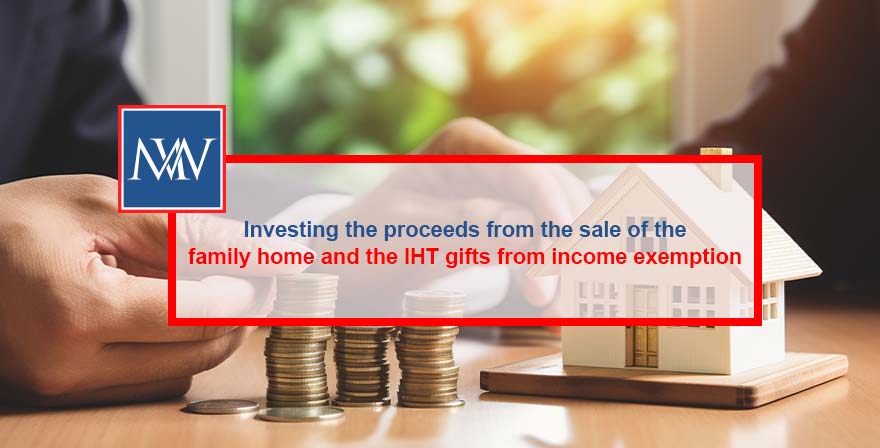
Investing the proceeds from the sale of the family home and the IHT gifts from income exemption
For many people, there will come a time when it becomes sensible or necessary to sell the family home, either to downsize or because of a move to live with a relative or into care. This may result in funds being released, which may be considerable. Thoughts may turn to whether now is the time to pass wealth down to subsequent generations. However, this must be balanced against the need to retain sufficient funds to meet one’s lifestyle and any current and future care costs.
From an IHT tax perspective, taking action to minimize future tax bills is possible.
Subject to available exemptions, inheritance tax is payable to the extent that the deceased’s estate exceeds their available nil rate bands. This may include the deceased’s nil rate band and, where the main residence or funds released from the sale of it are passed to a direct descendant, the residence nil rate band. Currently, these are set at £325,000 and £175,000, respectively. Where the deceased is widowed, their estate can also use any unused nil rate bands of their spouse or civil partner.
Rather than giving away the proceeds from the sale of the home, a decision may be made instead to invest the proceeds. Increases in interest rates in recent years provide a greater opportunity to earn investment income than in the past. Where the income generated is not needed to maintain living costs, it can be given away. This can be advantageous from an inheritance tax perspective, as an exemption exists for gifts out of income.
Gifts out of income exemption
An inheritance tax exemption is available for normal expenditure out of income. To benefit from the exemption, gifts must:
- form part of the transferor’s normal expenditure;
- be made out of income; and
- leave the transferor with enough income to maintain their standard of living.
To utilize this exemption, income not needed to maintain the transferor’s standard of living could instead be used to help a child with rent, pay a grandchild’s school fees, or pay part of a son or daughter’s monthly mortgage payments. What is key here is that there is a regular pattern of spending, rather than ad hoc cash gifts, such that the payment of the rent or the school fees becomes part of the transferor’s normal monthly expenditure. Where this is the case, the gifts are not treated as potentially exempt transfers (so there is no IHT charge if the transferor dies within seven years); rather, they are exempt from inheritance tax and fall outside the transferor’s estate.
Case study
Betty is a widow in her eighties. She feels that she can no longer manage on her own at home. Her son invites her to live with him and his wife and she moves in with them.
Betty sells her home for £900,000. On her death, her estate will benefit from both her and her late husband’s nil rate bands and residence nil rate bands (totaling £1 million). She has savings and investments of £80,000, which generate an income of £4,000 a year. Betty receives pensions of £30,000 a year, which are more than sufficient to meet her living costs.
Betty invests the proceeds from the sale of her home, receiving interest of £54,000 a year. Her savings allowance of £500 is already used against the income from her existing investments. At 2024/25 rates, she will pay a tax of £18,346 (£16,270 at 20% + £37,730 at 40%), leaving her with £35,654 after tax. As her estate is already close to her available nil rate bands, from a tax perspective, if she retains the income, and passes it on at death, it will suffer a further charge of 40%, reducing the amount available to her family.
However, if instead she decides to take advantage of the exemption for normal expenditure out of income and meet, say, rent of £1,200 a month for each of her two grandchildren, she can pass on £28,800 a year free of inheritance tax, allowing her family to benefit from more of her estate. Had she instead left the £28,800 in the bank, passing it on at her death, it would have suffered IHT at 40%, reducing the amount available to her family by £11,520 a year to £17,280. Any lost interest in her savings income is more than outweighed by the IHT savings.
Need Accountancy Support?
For information on bespoke training, or if you have any other questions for Makesworth Accountant, please fill in your details below
















 151
151